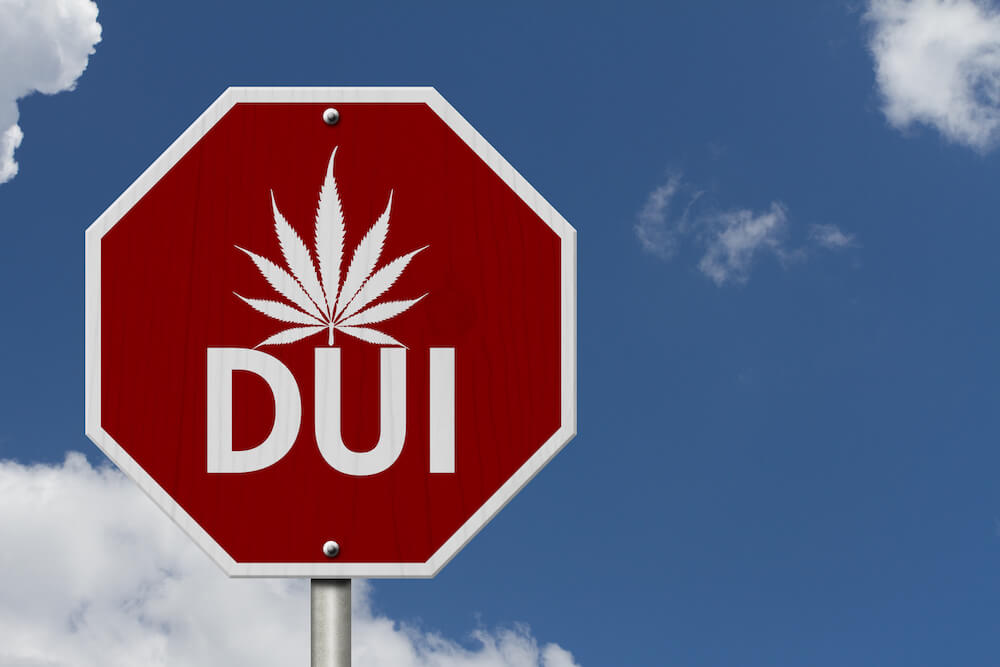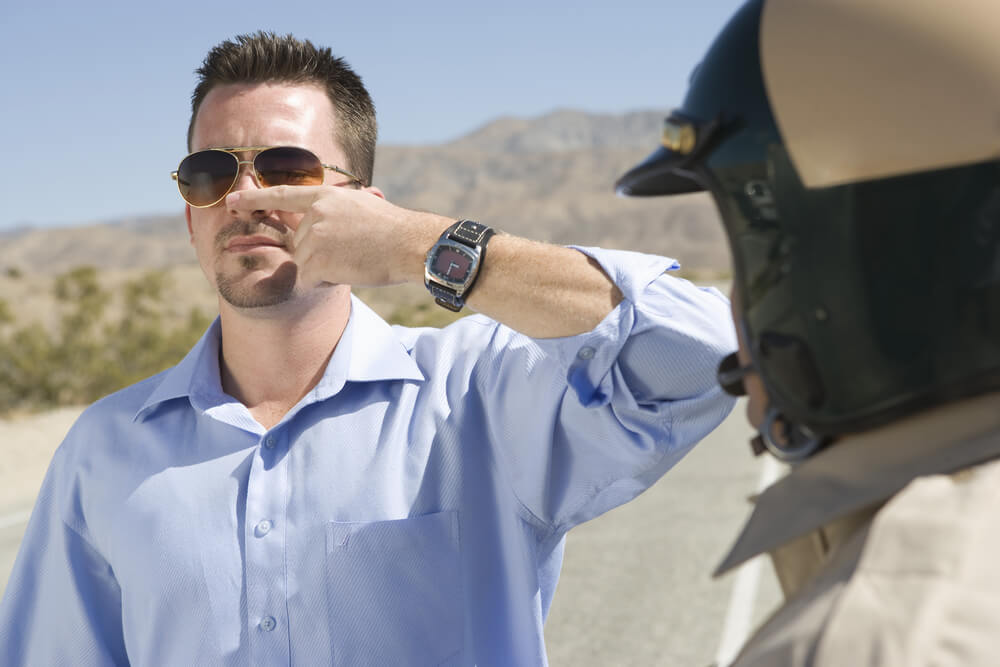victims for over 25 years.
How to Avoid a Marijuana DUI
Don’t drive high. Ha!
We don’t work with marijuana DUI offenders; that’s for criminal defense lawyers. But we fiercely represent DUI accident victims. So if you’re injured in a DUI accident, please get in contact with us as soon as possible.
Marijuana DUI test – how can police tell if you’re driving high?

Naturally, law enforcement has modeled their marijuana DUI protocols after alcohol DUI protocols.
While there is no breathalyzer equivalent for testing for marijuana, there is a legal limit of THC set at five nanograms per milliliter of blood. Blood tests take longer and are not usually administered during a traffic stop. But refusing to submit to a test could warrant further investigation.
The trouble is THC and alcohol don’t react the same in the body. THC levels in the blood can remain high for extended periods of time. People who consume cannabis products every day, like those who use it medicinally, likely have detectable THC in their blood all the time.
So while blood tests are effective in detecting THC in the body, it’s impossible to prove if a person was impaired while driving with only a blood test. The National Institute of Justice has more information.
How can they ask for a blood test submission without any proof of impairment?

Field sobriety tests remain popular.
It’s proven that failure to complete two of these four tests is enough to suspect someone is under the influence of marijuana. (Survey administered on individuals only under the influence of marijuana, no alcohol or other drugs.)
- Balancing on one leg while counting down out loud
- Standing with eyes closed and estimating the passage of 30 seconds
- Repeatedly touching the tip of the nose with alternating index fingers
- Taking a series of heel-to-toe steps in a prescribed way
Taking it a step further, Colorado law enforcement can be trained to be a Drug Recognition Expert (DRE). DREs can then be requested by other officers who need help assessing a driver’s behavior during a stop.
Advanced Roadside Impaired Driving Enforcement, or ARIDE, is another, more extensive training police may have to be better equipped to spot impaired behaviors.
Bottom line: if an officer thinks for any reason that a driver could be a danger to themself or others they can detain the driver.
Then, there are the obvious signs that police look for, too:
- The detection of marijuana smell on your person or in the vehicle
- Physically, if your eyes appear bloodshot or your pupils are dilated
- Unusual patterns in your speech
- Marijuana products, packaging, or paraphernalia in the car
- Poor driving, too slow, too fast, swerving, and the like
In the end, the police are trying to detect ANY KIND of impairment. The specific drug causing someone to be impaired is of very little importance compared to their desire to get that person off the street.
At the O’Sullivan Law Firm, we take zero pity on DUI criminals. Having worked with countless DUI accident victims and their families we are all too familiar with the atrocities that these criminals commit.
If you like to get high recreationally, just stay off the roads. Period.
If you’re using marijuana for medicinal purposes, keep your medical marijuana card with you at all times, don’t drive if you feel high, and don’t leave pot paraphernalia lying around in your car to avoid unnecessary scrutiny.
It’s always illegal to drive under the influence of THC. If you’re breaking the law while involved in a traffic accident you cannot be well represented in court.
Free Consultation
Search For
Recent Articles
- Are all motorcycles created equal?
- Frequently Asked Questions about Personal Injury Attorneys
- How Do Personal Injury Attorneys Calculate Future Medical Expenses in a Car Crash Settlement?
- Ways to Increase Your Visibility When Riding Your Bicycle in Denver
- 5 Reasons to Hire a Personal Injury Attorney if a Loved One Is Injured
Categories
- Arvada
- Aurora
- Auto Accident eBook
- Auto Insurance
- Bicycle
- Bicycle/Motorcycle Accidents
- Bodily injury
- Car accidents
- Centennial
- Colorado
- Colorado Legislature
- community
- Concussion
- Denver
- distracted driving
- DUI Accidents
- Englewood
- Events
- Flood Insurance
- Fort Collins
- Highlands Ranch
- Hit and Run
- In The News
- insurance companies
- Lakewood
- Littleton
- Marijuana DUI
- Motorcycle Accidents
- Motorcycle Insurance
- Motorcycle Law eBook
- Motorcycles
- Newsletter
- Pedestrian
- Personal Injury Law
- Safe Driving
- Safety
- Scooters
- technology
- Thornton
- Tips
- Uncategorized
- vibrio vulnificus bacteria
- Videos
- Westminster
- Winter Driving
Archive
- March 2024
- February 2024
- January 2024
- December 2023
- November 2023
- October 2023
- September 2023
- August 2023
- July 2023
- June 2023
- May 2023
- April 2023
- March 2023
- February 2023
- January 2023
- November 2022
- September 2022
- April 2022
- March 2022
- February 2022
- January 2022
- December 2021
- November 2021
- October 2021
- September 2021
- August 2021
- July 2021
- June 2021
- May 2021
- April 2021
- January 2021
- December 2020
- November 2020
- October 2020
- September 2020
- August 2020
- July 2020
- June 2020
- May 2020
- April 2020
- March 2020
- February 2020
- January 2020
- December 2019
- November 2019
- October 2019
- September 2019
- August 2019
- July 2019
- June 2019
- May 2019
- March 2019
- February 2019
- January 2019
- December 2018
- November 2018
- October 2018
- September 2018
- August 2018
- July 2018
- June 2018
- May 2018
- April 2018
- March 2018
- February 2018
- January 2018
- December 2017
- November 2017
- October 2017
- September 2017
- August 2017
- July 2017
- June 2017
- May 2017
- April 2017
- March 2017
- February 2017
- January 2017
- December 2016
- November 2016
- October 2016
- September 2016
- August 2016
- July 2016
- June 2016
- May 2016
- April 2016
- March 2016
- February 2016
- January 2016
- December 2015
- November 2015
- October 2015
- September 2015
- August 2015
- July 2015
- June 2015
- May 2015
- April 2015
- February 2015
- December 2014
- November 2014
- October 2014
- September 2014
- July 2014
- June 2014
- May 2014
- April 2014
- March 2014
- February 2014
- January 2014
- October 2013
- October 2012
- September 2012
- August 2012
- July 2012
- February 2012
- August 2011
- March 2011
- October 2010